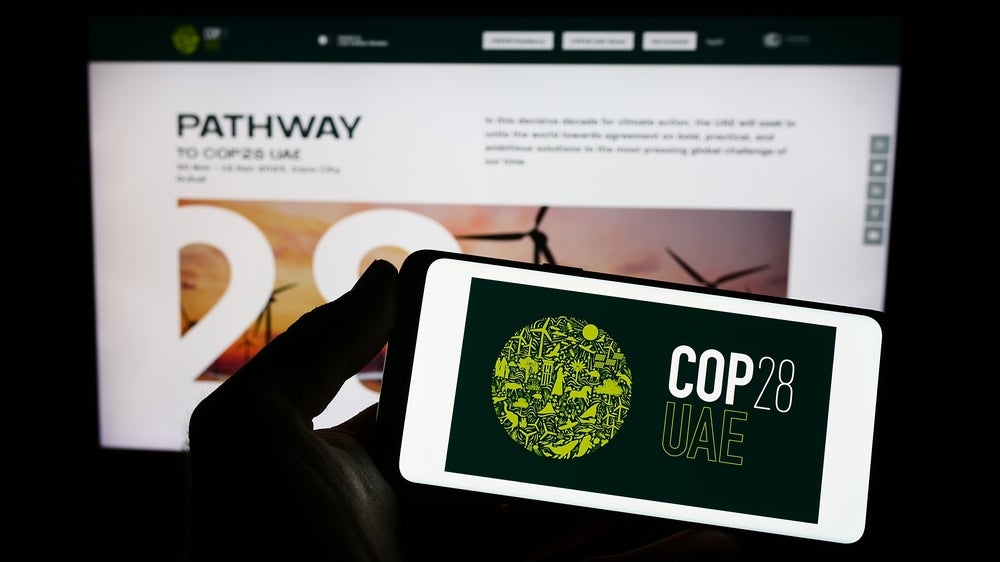COP28 marked the first time nations agreed to transition away from fossil fuels to achieve net zero greenhouse gas emissions by 2050.
This forms part of the overarching goal to limit global warming to 2°C above pre-industrial levels, and aim for 1.5°C, as laid out in the UN’s 2015 Paris Agreement.
What is in the COP28 agreement?
The COP28 deal is set out in the UN’s landmark First Global Stocktake, which notes that the world remains “not yet collectively on track” to meet the ambitions of the Paris Agreement.
The eight key measures nations agreed on were:
- Tripling the renewable energy capacity globally and doubling the global average annual rate of energy efficiency improvements by 2030.
- Accelerating efforts towards the phase-down of unabated coal power.
- Accelerating efforts globally towards net zero emission energy systems, utilizing zero- and low-carbon fuels well before or by around mid-century.
- Transitioning away from fossil fuels in energy systems, in a just, orderly, and equitable manner, accelerating action in this critical decade, so as to achieve net zero by 2050 in keeping with the science.
- Accelerating zero- and low-emission technologies, including, inter alia, renewables, nuclear, abatement, and removal technologies such as carbon capture and utilization and storage, particularly in hard-to-abate sectors, and low-carbon hydrogen production.
- Accelerating and substantially reducing non-carbon-dioxide emissions globally, including in particular methane emissions by 2030.
- Accelerating the reduction of emissions from road transport on a range of pathways, including through the development of infrastructure and rapid deployment of zero and low-emission vehicles.
- Phasing out inefficient fossil fuel subsidies that do not address energy poverty or just transitions, as soon as possible.
General reception to COP28
The UN hailed the deal as the “beginning of the end” of the fossil fuel era, marking the first time nations agreed to move away from fossil fuels. The executive director of the International Energy Agency, Fatih Birol, praised the deal but said: “greater efforts are needed on finance for developing economies”. Former US Vice President Al Gore said the deal was an “important milestone” while Nicholas Stern, a professor of sustainable finance at the London School of Economics, said it was “pretty good”.
Critics such as the World Wildlife Federation suggested the deal does not go far enough, with the agreement stopping short of calling for the full phase-out of fossil fuels. The Alliance of Small Island States said there was a “litany of loopholes” in the deal. There were also concerns about the acknowledgment of the potential role of transitional fuels in the energy transition, which could support the ongoing use of gas. Additionally, there are no legal mechanisms requiring nations to meet their obligations.
How well do you really know your competitors?
Access the most comprehensive Company Profiles on the market, powered by GlobalData. Save hours of research. Gain competitive edge.

Thank you!
Your download email will arrive shortly
Not ready to buy yet? Download a free sample
We are confident about the unique quality of our Company Profiles. However, we want you to make the most beneficial decision for your business, so we offer a free sample that you can download by submitting the below form
By GlobalDataCOP28 increased focus on methane
One of the key challenges that will arise for corporates from COP28 is the commitment to substantially reduce methane emissions by 2030. Methane emissions are significant in the agriculture sector but are biogenic (from natural sources and not fossil fuels), so are not typically included in emissions accounting, reporting, and targets. The agriculture sector was already only in the early stages of its net zero journey, especially when compared to more advanced sectors like technology and automotive. Regulatory pressure on methane emissions will be a rude awakening for the sector.
The methane commitment will also add pressure on companies that have agricultural suppliers such as consumer goods, retail, and foodservice. Such companies are already under pressure to report emissions related to forests, land, and agriculture (FLAG emissions), with the GHG Protocol and SBTI producing new standards to measure and target these emissions.
No quick revival for carbon markets
Outside of the Global Stocktake, countries were hopeful of reaching a deal that would have created a new certification for carbon offsets backed by the UN. Carbon offsets allow companies to offset their emissions when they cannot reduce their emissions by removing or avoiding emissions elsewhere. No agreement was reached as negotiators could not agree on the types of offsets to be included.
Such a deal may have revived the fortunes of the carbon offset market after two major scandals damaged its credibility in 2023. This is likely to remain the case throughout 2024, with UN-backed offsets now off the table until 2025 at the earliest. Companies wanting to offset their emissions are best off waiting until carbon removal technologies like direct air capture have become cheaper or get in early and invest in them now as a raft of tech majors have started to.








